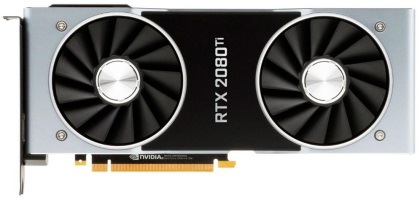

General info
The main nomenclature characteristics of video cards AMD Radeon RX Vega 64 and NVIDIA GeForce RTX 2080 Ti. Pay attention to the position in the performance rating to choose the best one.
Technical specs
Choose the best graphics card between AMD Radeon RX Vega 64 and NVIDIA GeForce RTX 2080 Ti based on manufacturing process, power consumption, and base frequency and overclocking potential of the GPU.
Compatibility, dimensions and requirements
Additional technical information, does not greatly affect the performance rating when comparing the AMD Radeon RX Vega 64 and NVIDIA GeForce RTX 2080 Ti.
Memory
Graphics card memory is used to store calculations. Modern software and 3D games require more and faster memory. The higher these parameters, the more productive the chip. The difference in these characteristics AMD Radeon RX Vega 64 and NVIDIA GeForce RTX 2080 Ti can be seen in this section.
Video outputs and ports
The difference between the interfaces and ports of video cards AMD Radeon RX Vega 64 and NVIDIA GeForce RTX 2080 Ti, the size and number of monitors.
Technologies
The difference between AMD Radeon RX Vega 64 and NVIDIA GeForce RTX 2080 Ti is the additional functionality.
API support
The difference in supported APIs is AMD Radeon RX Vega 64 and NVIDIA GeForce RTX 2080 Ti. Hardware support (API) is not considered in synthetic benchmarks and performance tests.
Gaming performance
Select form the list the required name to identify gaming performance for AMD Radeon RX Vega 64 and NVIDIA GeForce RTX 2080 Ti graphics cards. The result shows how fast the game will run and whether it can be run on this computer. The different monitor resolutions – from low to 4K – are used for testing. Find out is the AMD Radeon RX Vega 64 or NVIDIA GeForce RTX 2080 Ti good for gaming.
|
low
1280x720 |
med.
1920x1080 |
high
1920x1080 |
ultra
1920x1080 |
QHD
2560x1440 |
4K
3840x2160 |
||
| Horizon Zero Dawn (2020) | AMD Radeon RX Vega 64 | 111 | 80 | 68 | 56 | 44 | 26 |
| NVIDIA GeForce RTX 2080 Ti | 159 | 146 | 133 | 115 | 94 | 54 | |
| Death Stranding (2020) | AMD Radeon RX Vega 64 | 170 | 118 | 107 | 103 | 72.1 | 38.9 |
| NVIDIA GeForce RTX 2080 Ti | 174 | 173 | 170 | 169 | 133 | 78.8 | |
| F1 2020 (2020) | AMD Radeon RX Vega 64 | 256 | 167 | 140 | 99.5 | 79.7 | 51.6 |
| NVIDIA GeForce RTX 2080 Ti | 289 | 247 | 240 | 202 | 162 | 100 | |
| Gears Tactics (2020) | AMD Radeon RX Vega 64 | 348.7 | 195.5 | 128 | 83.7 | 56.6 | 29.8 |
| NVIDIA GeForce RTX 2080 Ti | 321 | 243 | 166 | 126 | 101 | 64.7 | |
| Doom Eternal (2020) | AMD Radeon RX Vega 64 | 241 | 182 | 153 | 140 | 95.3 | 48.6 |
| NVIDIA GeForce RTX 2080 Ti | 315 | 290 | 266 | 259 | 204 | 113 | |
| Legend | |
| 5 | Stutter – Insufficient data. Similar graphics cards stutter, the game is likely to show a low frame rate. There will be some lags. |
| May Stutter – Insufficient data. Similar graphics cards stutter, the game is likely to show a low frame rate. There will be some lags. | |
| 30 | Fluent – According to the results of benchmarks the game should run at 25 frames per second (fps) |
| 40 | Fluent – According to the results of benchmarks the game should run at 35 frames per second (fps) |
| 60 | Fluent – According to the results of benchmarks the game should run at 58 frames per second (fps) |
| May Run Fluently – Insufficient data. Similar graphics cards show a smooth frame rate, comfortable for the game. | |
| ? | Uncertain – Graphics cards testing has shown that a slower card can provide a high and stable frame rate for the same operation. |
| Uncertain – The work of the video card in the game is still being studied. Interpolation among analogs is not possible. | |
| The value depicts the average frame rate. Hovering over the value, you can get individual results. | |
Advantages of AMD Radeon RX Vega 64
Advantages of NVIDIA GeForce RTX 2080 Ti
32.19% faster in synthetic tests
Cheaper ($1265 (1.3x MSRP) vs $1330 (2.7x MSRP))
More pipelines (4352 vs 4096)
Finer manufacturing process technology (12 nm vs 14 nm)
Less power consumption (250 Watt vs 295 Watt)
More maximum RAM amount (11 GB vs 8 GB)
More memory bandwidth (616.0 GB/s vs 483.8 GB/s)
G-SYNC support
VR Ready
Multi Monitor
So, AMD Radeon RX Vega 64 or NVIDIA GeForce RTX 2080 Ti?
Judging by the results of synthetic and gaming tests, we recommend NVIDIA GeForce RTX 2080 Ti .


















